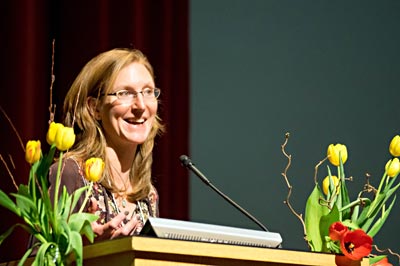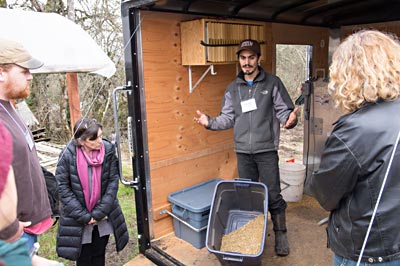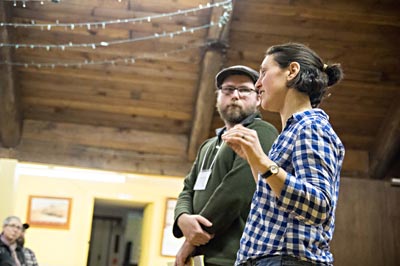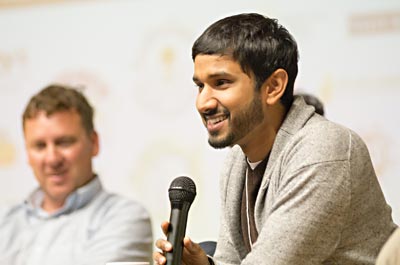Organic Seed Alliance Seed Internship Program
 |
| Micaela Colley, executive director of Organic Seed Alliance, spoke of seeds as a “public, natural resource that we all know demands careful stewardship.” Photo courtesy of OSA |
The eighth Organic Seed Growers Conference was convened in February 2016 by Organic Seed Alliance (OSA) in Corvallis, Oregon. Micaela Colley, executive director of OSA, welcomed participants, saying that the conference theme – cultivating resilience – “reflects the urgency of developing biologically diverse seed systems that weather the impacts of unstable climates and dwindling natural resources. It also speaks to the need for increasing the diversity of stakeholders and innovators engaged in seed systems to discourage the concentration of market power and ownership of seed – a public, natural resource that we all know demands careful stewardship.”
Six students from College of the Atlantic in Bar Harbor, Maine, attended the conference and report, below, on a few ways to meet those needs.
Proceedings of the conference, available at https://seedalliance.org/, cover organic plant breeding; organic seed production; organic seed economics, business and networking; organic seed advocacy and policy; and genetic resources and conservation.
Bringing Seeds Home for Heritage and Health
A sacred relationship with seeds and land continues to connect indigenous people to their history and values, according to a conference session called “Building Resilience Through the Upper Midwest Indigenous Seed Network.” The idea that “what we eat is who we are” resonates deeply with traditional approaches to maintaining health and well-being and energizes resistance to the processed-food diets underlying the increase in chronic diseases, including diabetes – now so normalized, explained speaker Diane Wilson, that Native children believe it is simply a given.
Speakers Jamie Holding Eagle of the White Earth Land Reclamation Project, Diane Wilson from Dream of Wild Health, and Zachary Paige from the White Earth Land Recovery Project discussed the importance of reintegrating traditional foods and revitalizing the relationship to the seeds of food plants, in practice and in spirit. The Upper Midwest Indigenous Seed Savers Network includes 13 Native communities partnering to share seed knowledge and to preserve culturally significant indigenous seed.
“A major goal of this project,” said the three, “is to enhance the health of American Indian people by selecting crops for high nutritional content and superior flavor, building an agricultural base to feed Native communities.” Currently, 13 percent of the 34,359 Native individuals in the area save seed. The network is encouraging more seed saving through “Train the Trainers” workshops. It also promotes localizing Native economies and creating opportunities for economic development through traditional food production.
At North Dakota State University, Holding Eagle is seeking specific medicinal properties of traditional crop varieties to counter rising rates of diabetes, alcoholism and drug abuse among her people. One promising food medicine for diabetes is a hot water extract of a squash crop and flower. She is also working with clovers. Holding Eagle performs this traditional practice with a focus on mindfulness and of giving thanks through singing and prayer. In this revitalization work of heritage and health, Holding Eagle profoundly asserted that seeds are not merely a form of life but are our relatives, and we have responsibilities to nurture them in their own right. With deep emotion, she compelling explored our origins, both human and seed, and our forsaken and broken relationships.
Wilson promotes land stewardship by connecting Native youth to the land via seed saving, gardening and cooking programs. According to the Dream of Wild Health website, her program collection has more than 300 varieties of saved seeds, and the organization’s farm serves more than 3,000 Native and non-Native people through tours, workshops, community feasts, school visits and summer programs.
Paige mobilizes Native and outside communities in an effort to bring the food economy back into the reservation. Through workshops on seed saving, network sharing, webinars and an Indigenous Farming Conference, he works to reverse the fact that 86 percent of money spent on food currently leaves the reservation.
All three spoke passionately about the importance of traditional practices and seed saving for health and economic resilience for Native peoples.
– Elaina Burress and Jenna Farineau
 |
| Sebastian Aguilar of Chickadee Farm in Talent, Oregon, said that augmenting seed production into a farm system can be profitable. Photo courtesy of OSA |
 |
| Sarah Kleeger talked about the young seed company, Adaptive Seeds. Photo courtesy of OSA |
Seed Economics
The demand for organic seed is alive and growing – and profitable, according to a session on seed economics by Sebastian Aguilar of Chickadee Farm in Talent, Oregon; Daniel Brisebois of Tourne-Sol Co-operative Farm in Les Cèdres, Quebec; Sarah Kleeger of Adaptive Seeds in Sweet Home, Oregon; and Steve Peters, regional outreach assistant for Organic Seed Alliance.
Seed production can benefit many types of farm operations. “Seed companies,” said Brisebois, “want good seed growers.”
Seed can be sold wholesale and/or retail. Both can be profitable but differ in costs, structures and strategies. “Well managed bulk seed crops can generate $20-50K/acre
(sometimes significantly more!),” according to Brisebois in the conference proceedings, where sample budgets are available.
Aguilar, a wholesale grower, said the most important aspect of growing seed “is learning how to run a good farm” from the ground up, just as with any other successful business. As you develop, keep simplifying and refining your system, he said. Augmenting seed production into your system, whether you’re a first-time grower or a large-scale farmer, can be a profitable business that adds economic and ecological value to your operation.
Brisebois explained, “As a seed producer, you have a once-a-year relationship with your customers.” The most dramatic difference in wholesale and direct sale operations is seasonality: “For a wholesaler, you work all summer, the fall arrives, and the work is over; for a direct seller, the fall arrives and the second round of work is just beginning.” Wholesale involves bulk production, with fewer customer relations.
Direct sales require extensive winter work as well as appropriate storage space, a finer cleaning process (more-skilled labor), a heightened responsibility for ensuring seed quality through germination testing, sourcing of packages, printing costs, skilled and efficient packaging labor, website and/or catalog maintenance, filling orders, costs of shipping, and, possibly, distributing and managing seed racks at local or regional outlets.
Choosing the right crops is vital to the success of any seed operation and varies with climate, soils, crop spacing, extended and variable growing cycles, personal experience and market demand. Also consider whether a seed crop fits with your farm system, including your infrastructure, crop rotation, pollinators and labor. Seed production requires added budgeting, record keeping and long-term planning.
For more on organic seed production from Brisebois, see “Seed Production at Tourne-Sol Co-operative Farm” in the spring 2015 issue of The Maine Organic Farmer & Gardener.
Kleeger said that at Adaptive Seeds, certain varieties have “generated a slight deficit” through wholesale rack sales, but the young company views this “as a valuable marketing expense, in the sense that seed racks are nurturing their public image and relationships.” Having a strong wholesale operation allows Adaptive Seeds to experiment in the direct sales market.
Peters reiterated the importance of Aguilar’s ideal of simplicity and recommended “starting at a level that’s manageable, while getting your skills down and having contingency plans.” He emphasized that building and strengthening relationships will only build a more resilient grassroots organic farming food system.
– Page Hill and Wayne Biebel
 |
| Aabir Dey, Ontario regional program coordinator for the Bauta Family Initiative on Canadian Seed Security, works with programs that help producers scale up. Photo courtesy of OSA |
Scaling Up Seed Production
Four experts offered suggestions and examples of strategies for scaling up seed production. Amid their varied perspectives were common themes of cooperation, honest assessments, and thorough planning and foresight.
Steve Peters emphasized the importance of scaling appropriately: In addition to identifying goals and potential limitations, create a flexible 5- to 10-year plan that includes experimenting with increased production on a trial scale (e.g., 5 by 300 feet), creating a market for new varieties, and building or sharing infrastructure. He reminded growers to understand and abide by contract terms and to seek support from seed companies, including field visits, consultations and seed cleaning services.
Aabir Dey, Ontario regional program coordinator for the Bauta Family Initiative on Canadian Seed Security (www.seedsecurity.ca), outlined its support for producers, in collaboration with Seeds of Diversity Canada and USC Canada. Their programs help producers scale up through grants, peer exchange and training. The “Seed Grow-Outs” program involves close work between Seeds of Diversity and about 80 farmers to produce open-pollinated vegetable varieties intended for ecological growth at the farm scale – varieties unavailable in bulk from local or international suppliers but in demand
from ecological market gardeners. Participants have trialed about 210 regionally adapted varieties. The grow-outs occur within the Vegetable Seed Producers Network – clusters of interacting growers – which, Dey said, is a vital base of this regionally focused, collaborative project. He noted that virtually all Canadian vegetable farmers buy their seeds from fewer than six seed companies, most of which source their seed from outside of Canada from international growers.
Melanie Sylvestre of the British Columbia Eco Seed Co-op (BCESC) and the University of British Columbia Farm spoke about “Scaling Up Through Cooperation.” The BCESC is owned by a group of farmers aiming to increase the quality and quantity of ecologically grown, economically feasible seed for BC farmers. (Dey said Canadian production of ecologically-grown vegetable seeds is estimated at CAD$1.5 million – about CAD$350,000 of that being certified organic.) Each member grows a few seed crops, which are combined to create a catalog of diverse options marketed to farmers. This model also generates “reciprocal promotion” by connecting gardening customers with members who also sell seed packets. One challenge members have faced is pricing seed while allowing for ethical competition among members. “Building community around the intention of scaling up has been a big part of the current success of the BCESC,” said Sylvestre.
Andrew Rainey, a regional U.S. production specialist for Enza Zaden, shared perspectives from one of the largest vegetable seed production companies in the world. He said growers must try to work cooperatively and that more organic seed as well as certified organic land are needed.
Realistic assessments, goals and strategies facilitate success, but the theme of experimentation also permeated this session and the conference in general. In scaling up vegetable seed production, speakers advised conference participants to be conservative, seek support, work cooperatively among peers, and then start growing!
– Grace Brown and Haleigh Paquette
Organic Seed Alliance Seed Internship Program
In March Organic Seed Alliance and the Multinational Exchange for Sustainable Agriculture launched the Seed Internship Program (https://apply.mesaprogram.org/osa/) to match individuals who want to learn about seed production with experienced growers. The 6-month internships combine hands-on education, farm-based independent study, and classroom and online learning.
The goal of the program is to grow a network of seed farms that give interns real-world experience in seed production, business planning and other skills. Organic seed production is potentially lucrative for farmers who are skilled in this field – and despite the demand for organic seed, insufficient numbers of trained organic seed farmers exist.
